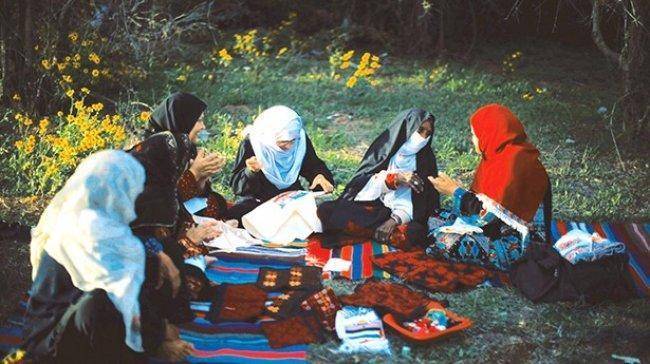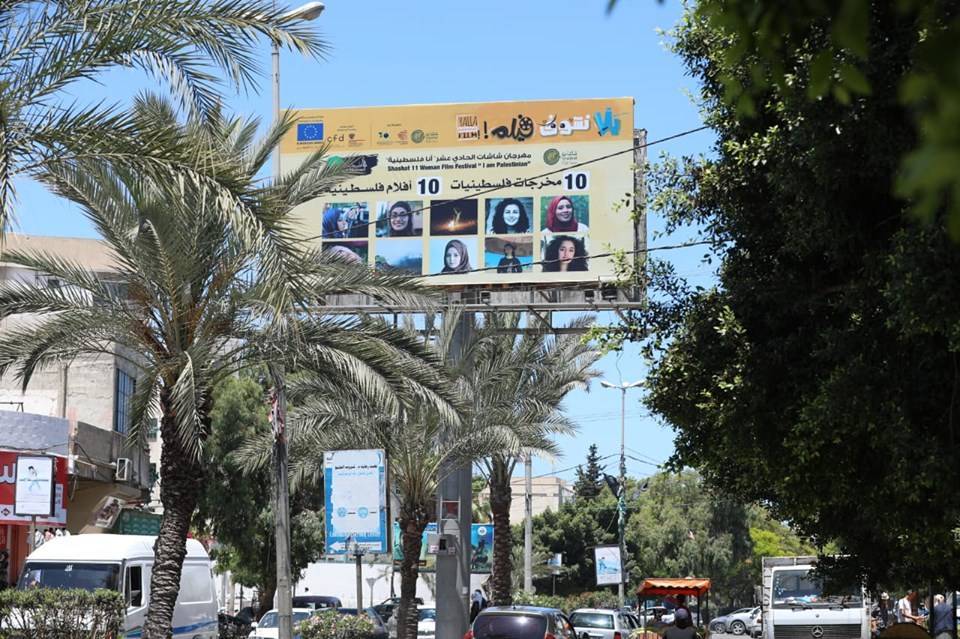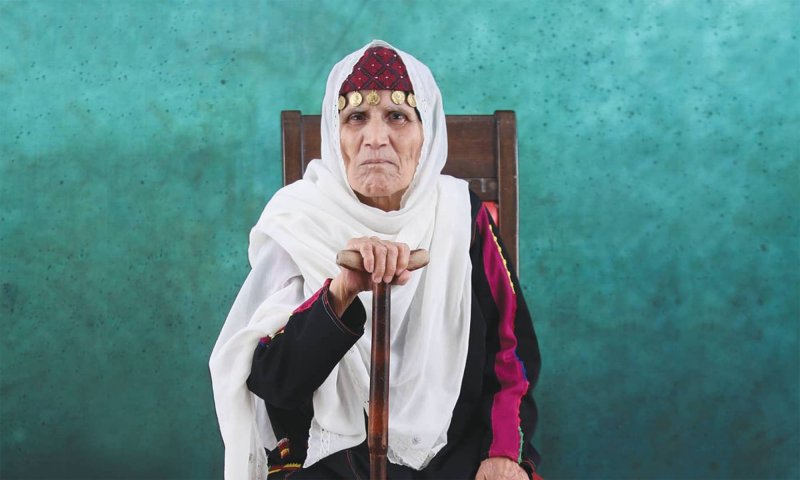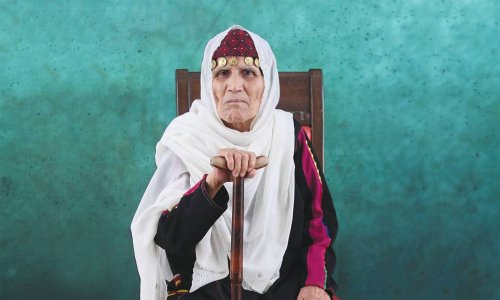The tales of children have been forgotten and the "ghouls" that they were intimidated with to sleep early disappeared, instead the war machine with its fearsome planes, bombardment, impoverishment and siege have become the ghoul that haunts children both in dreams and in in their daily life. Mothers struggle to create fantasy worlds for their children to distance them from weapons and blood. Directors that struggle to learn directing and filming in a patriarchal society, living under siege in an occupation that does permit artists to leave the Gaza Strip easily.
Under an edition named "I am Palestinian", the 11th Shashat Women's Film Festival launched simultaneously in Ramallah and the Gaza Strip, with the participation of 10 films by young female directors from the West Bank, Jerusalem and Gaza. The films dealt with various topics about war, heritage, identity, friendship, and the suffering of Palestinian women under occupation.
"I am Palestinian" films are part of the project "Yalla Neshof Film!" The project is being implemented by the Women's Cinema Screening Foundation, in partnership with the University Graduates Association in Gaza, and the Sunflower Foundation for Human and Environmental Protection, a three-year cultural and community project funded by the European Union and co-financed by the CFD Foundation and the Polish representative in Palestine.
Try to imagine the darkness of night, with a power outage, death and random bombing around you, not knowing when your turn will come. You wonder, if you sleep and cover your head, will the war forget you?
Riham and Zeina, the director of "Sard" lead us in a visual journey narrated by Riham about her journey out of Gaza, which has been under siege for 10 years. Can she go through the border crossing this time?
Threads of Silk or The Palestinian Thobe- a Nation’s Journey”
The film's director, Walaa Saadeh (29 years), describes the idea of the film “I was provoked by many attempts by the Zionist occupation to steal our Palestinian identity, the latest of which was when the Israeli Minister of Culture wore our national dress, the embroidered thobe, in a photo taken in the al-Aqsa mosque. In an attempt to revive our heritage and emphasize our identity, and to spread this culture to future generations, I will not forget this young girl who expressed her enthusiasm after watching the movie by taking out and wearing the old Palestinian dress in her wardrobe because she realized the importance of its heritage and national value, after she had considered it old fashioned".
The leading actress of "Silk Threads " caught Saade’s eye due to her special perspective on clothes and the homeland, "Um Faraj, a 97-year-old who lived in Jaffa before the Nakba, and had a very strong story about her life with embroidery and the garment that was parallel to the story of the entire country".
Not only that, what Palestinians wear expresses what their jobs are and the nature of their cities: "Every area in Palestine has a different way of embroidering the thobe and use different colour thread, for example the Ramallah thobe is white because it’s an urban area and a main city and its residents are not employed in agriculture thus can keep it clean, unlike in the villages or in the desert where they use black fabric, because they work the land and are sheep herders. Bachelorettes do not wear a garment embroidered with red threads, because it is striking, and decent girls should not draw attention to themselves, while widows wear a blue coloured thobe which is a declaration of mourning."

As to her overall experience in the film industry, Saadeh said: "Shashat" was like a lifeline for me and for many girls who want to study cinema and direct film, there was no such organization in Palestine that helped girls become directors, some of them may be allowed to travel to study cinema abroad. But to study film within Palestine was impossible due to the lack of cinema institutes and film theatres.
She explained: "Shashat helped me break the siege imposed by the occupation on my attempts to get out of Gaza, despite receiving scholarships to study cinema, art residencies and workshops in Europe over the past two years, but every time I tried to get out the occupation would stop me. They were difficult years, and sometimes I felt that my spirit broke down, and my soul is worn out every time you go to the checkpoint to wait for the ever rejected exit permit. It kills your spirit and you become miserable but when you are granted an opportunity through a national organization, Shashat helps you produce and distribute a film in a lot of places, effectively allowing me to respond to the occupation. They cannot prevent us, we will keep making films, and our voices will be heard despite the occupation”.
As to family restrictions and the chauvinistic view of women working in filmmaking, she said: "There is awareness in Palestinian society, it is not fanatical society, but the patriarchal view still persists especially in Gaza due to the political situation that imposed religious political norms and ideas, which curtailed and reduced the activities of girls working in media but Gaza is evolving for the better. Girls are completing their university education now, unlike in previous years. The outlook is slowly changing but some people remain in favour of marginalizing the role of women.”
As for her personal experience with her family, Saada says: "My experience was different, I didn’t tell my family I was making films or studying, I live in a village called Beit Hanoun and the hurdles placed on girls are burdensome, always questioned “where are you going, why are you late? I wanted to produce a film I was happy with and then I told my mother and brother first, and then my father came, and the film impressed them all. They were so entrenched in the resistance and thought that making films was frivolous but then they saw the film about embroidery and thobes they realized this was serious work, and it was my dream to make films in the future that really capture the Palestinian conditions, our human condition- a film about us wanting to die and for them to shoot us or us to shoot them, as filmmakers we need to push out of these boxes.
"Ghoul": The War Came and the Demons Disappeared
The name of the film "Ghoul" comes from folk tales in Palestinian culture. The story of the ghoul, which a mother tells so her children go to sleep early, is the story of an ogre who will kidnap and eat children who do not obey their parents. Today these children do not need the tales of the ghoul because the war itself is the ghoul, it lurks amongst them, and eats them alive by bombing or drowning- without need to revive the old tales of the Ghoul or “Abu Regl Masloukha” (the demon with the deformed foot).
Director Alaa Al-Desouki talks to Raseef22 about her film: "I chose to depict women after living through the experience myself, it is undeniable that women and men pay a big price but perhaps what a woman bears is heavier, for men are on the battlefield busy fighting, but the mother is at home fighting her fears and fighting to create hope for her children. Women in Gaza City or in any war zone suffer differently from women living in stability and safety.
Desouki describes her film: "I wrote it five years ago, after the war on Gaza in 2014, and in the myth the ghoul only comes out at night but war does not distinguish between day and night. Try to imagine the darkness of night, with a power outage, death and random bombing around you, not knowing when your turn will come. You wonder if you sleep and cover your head will the war forget you? It’s like our childhood when, for fear of Abu Regl Masloukha we slept quickly and covered our faces. Maybe if it was our turn to die we would not see or feel anything if we were hiding and pretending to sleep you don't know whether it's necessary to create an atmosphere of security just for the children or also for me as a mother first of all.
Al-Desouki said: "It took me four days and nights of shooting, we had some difficulties because we were shooting in a working class area during school and work hours. Electricity was cut, a generator was used, and the filming often extended to the early morning hours. And back then there was bombing and attacks and we were really experiencing an atmosphere of war.
Desouki rejects stereotypes of Palestinian women in drama and cinema: “I reject the role of the crying woman who lives solely to remember death and loss. Mothers, daughters and everyone living in Gaza lives just like anyone else in the world, we laugh and enjoy our loves, our lives are not all weeping, or misery or sorrow, we confront war, when it ends we stop, dress our wounds and continue our lives. In the end we are committed to our cause and we fight with what we have. There is no escape. Any Palestinian born anywhere in the world is made aware of our cause and begins to fight in his/her way whether with a gun, with a pen, with ideas or with knowledge.”
“Sard”: the Palestinian Crisis on Messenger Chat
Narrated by voice messages between two friends, Riham and Zeina, the director of "Sard" leads us in a visual journey narrated by Riham about her journey out of Gaza, which has been under siege for 10 years. For a year, Zeina and Reham exchanged voice messages via Facebook’s Messenger, recounting Reham's experience of looking for an opportunity to complete a master's degree abroad and her attempts to get out of Gaza.
"What does it mean to be a Palestinian?" Zeina Ramadan, director of the film, tell Raseef22. It was a futile and unclear question, then I thought of an angle only Palestinians could have experienced. so I thought about converting these voice messages that bring me together with my Gaza-based friend, who is trying to get out to finish her cinema studies abroad, and her constant attempts to overcome the border crossing and get permits."
Ramadan continued: “Her voice in the voice messages was very strong and tells about what is happening in Gaza, but not in the traditional way that shows the poor people of Gaza and we pity them, but a human voice holds moments of strength and weakness, persistence and the constant attempt to get out of the city, so I adapted the voice-notes to create the script and for animation.

The film discusses the difficulties faced by Palestinians in moving "When you are traveling from Gaza you do not know from where you will return whether through the crossing in Jordan or waiting for a long time at the Rafah crossing to open. My friend waited a month in Egypt to return to Gaza and the opening of the crossing, so I deliberately animated this inhumane wait at the Rafah crossing and depicting it as a large meat grinder, where human bodies are minced by the sun, the heat and the cold while waiting to cross.
Ramadan believes that Palestinian women suffer from two repressive regimes: occupation and patriarchy. The two systems collude sometimes, but we have a feminist movement and organizations that defend women’s rights, but their work is all on paper and have no application in the real because the Palestinian authority is crippled, the legislative council has not been working since 2006 and if you wanted to legislate a law to protect women against violence that must be issued by presidential decree which is an even more complicated process.
Shashat Festival: a Different Approach to Movie Making
Shashat differs from other film festivals for it handles filmmaking from its very beginning by training directors, supervising production, editing and distribution.
Founded in 2005, the Women's Cinema Foundation is Palestinian NGO focused on developing the capabilities of young Palestinian women, based on the centrality of women's participation in the production of a creative and contemporary Palestinian culture that develops concepts through a gender perspectiv. Shashat has been awarded the “Award for Excellence in Cinematography” by the Palestinian Ministry of Culture in 2010. The opening ceremony was held on 26 July this year in both Gaza and Ramallah.
"The title of this edition was inspired by the public's assessments and observations on the theme of the tenth edition of the festival, entitled "What is Tomorrow " and we sensed there was a lot of despair and depression among Palestinian youth who felt their identity was just based on political slogans so we decided to discuss these questions. Through productions by young women as subjective self-research, we ask questions about "what is the meaning of belonging and what is the meaning of identity, how to perceive all this as a Palestinian, how do you express it and how do you feel it?" Dr Aliaa Ersaghli, Director of the festival said in a conversation with Raseef22.
Ersaghli detailed the festivals philosophy “We followed the traditional method in the first two years of the festival by screening films from other countries through competitions and juries but then most of the films were untranslated and did not express the Palestinian situation, in addition it was difficult to distribute it to villages and camps of the West Bank, Gaza and Jerusalem. We had a clear goal: to support the young Palestinian local film production, and to produce films that reflect the local situation and address the local audience in its time and place."
The film industry in general faces social obstacles and a different reception environment in any country in the world. "We don't have a commercial cinema, our films are produced through the support of civil society support so all these related things, which sometimes depend on marketing women as a commodity but since this is not the case here families and society perceive it as a mode of resistance.
“Shashat produces films that mostly revolve around Palestinian social issues created by female directors, but not necessarily about women, but discusses environmental issues, political participation and storytelling about the Palestinian story which make families accept the girl's film work,” she says. But it becomes problematic when working late at night or filming in dangerous areas. For example, one of the most important films that we chose this year for the festival, and we developed the idea with the director, we stumbled in its implementation, because the parents refused to let their daughter go out with the crews to shoot at night far away from her village, and despite our attempts to convince them."
Raseef22 is a not for profit entity. Our focus is on quality journalism. Every contribution to the NasRaseef membership goes directly towards journalism production. We stand independent, not accepting corporate sponsorships, sponsored content or political funding.
Support our mission to keep Raseef22 available to all readers by clicking here!
Interested in writing with us? Check our pitch process here!




